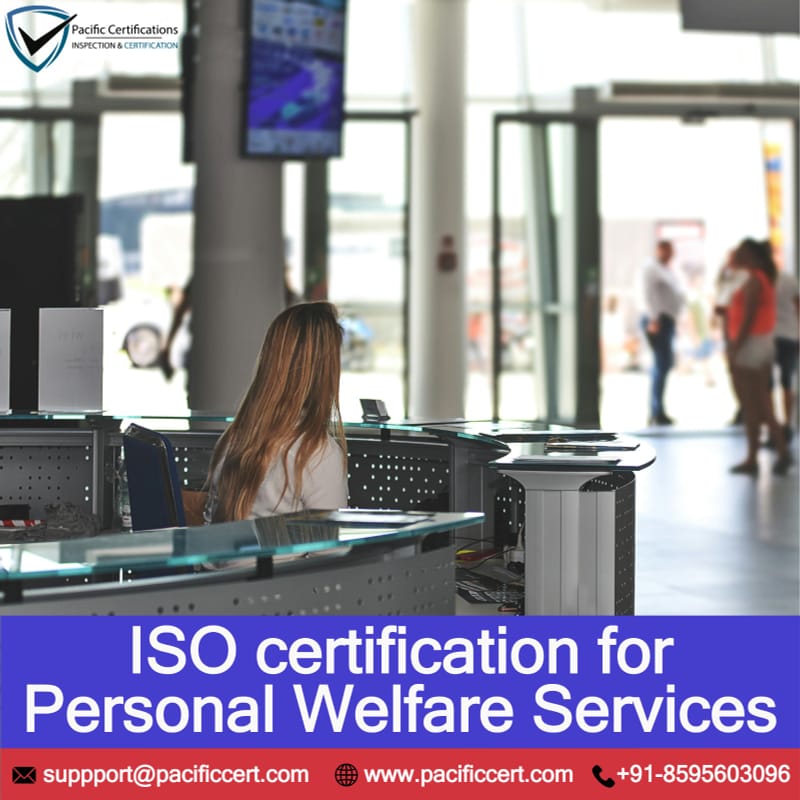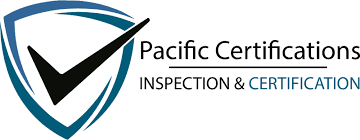ISO Certifications for Personal Welfare Services, Requirements and Benefits

Introduction
In today's competitive market, ensuring the highest standards of quality and safety is crucial for personal welfare services. Obtaining ISO certification can significantly enhance your credibility, streamline your operations, and demonstrate your commitment to excellence. At Pacific Certifications, we specialize in helping organizations achieve and maintain ISO certifications, tailored to their specific needs.
Key ISO Standards for Personal Welfare Services
ISO 9001:2015 - Quality Management Systems:
This standard sets out the criteria for a quality management system and is based on several quality management principles, including a strong customer focus, the motivation and implication of top management, the process approach, and continual improvement. It helps ensure that customers receive consistent, high-quality services.
ISO 14001:2015 - Environmental Management Systems:
ISO 14001 provides a framework for an effective environmental management system. It is designed for organizations looking to manage their environmental responsibilities in a systematic manner that contributes to the environmental pillar of sustainability.
ISO 45001:2018 - Occupational Health and Safety Management Systems:
This standard specifies requirements for an occupational health and safety (OH&S) management system, and gives guidance for its use, to enable organizations to provide safe and healthy workplaces by preventing work-related injury and ill health, as well as by proactively improving their OH&S performance.
ISO 27001:2022 - Information Security Management Systems:
ISO 27001 helps organizations keep information assets secure. It provides a framework for managing the security of assets such as financial information, intellectual property, employee details, or information entrusted to you by third parties
Click here to find out more applicable standards to your industry
How We Can Help?
At Pacific Certifications, we are committed to guiding you through the entire certification process with a human touch. Here’s how we can assist you:
Initial Consultation:
We start with a thorough understanding of your specific needs and objectives. This helps us to tailor our approach to best suit your organization.
Gap Analysis:
Our experts conduct a detailed gap analysis to identify areas that need improvement before you can achieve certification. This step is crucial to ensure that your processes and systems align with the ISO standards.
Training and Support:
We provide comprehensive training and support to your team, ensuring they understand the requirements of the relevant ISO standards and are prepared for the audit process.
Pre-Assessment Audit:
Before the final certification audit, we conduct a pre-assessment audit to ensure that all requirements are met and to address any issues that may arise.
Certification Audit:
Our experienced auditors conduct a thorough certification audit, evaluating your compliance with the ISO standards. We strive to make this process as smooth and stress-free as possible.
Continual Improvement:
Post-certification, we continue to support you with regular surveillance audits and guidance on continual improvement. This ensures that you maintain your certification and continue to improve your processes.
Ready to take your personal welfare services company to the next level?
Feel free to reach out to us at [email protected] for any inquiries or to schedule a consultation. We look forward to working with you!
Requirements of ISO Certification for Personal Welfare Services
ISO certification for Personal Welfare Services involves fulfilling specific requirements set by the relevant ISO standards and offers a range of benefits to organizations that achieve these certifications. Below are the requirements of achieving ISO certification and the benefits that come with it:
The requirements for ISO certification can vary depending on the specific standard being applied for, but generally involve the following steps and components:
Understanding the Standard:
Organizations must fully understand the requirements of the ISO standard(s) they are applying for. This involves detailed knowledge of the processes and criteria outlined in the standard.
Development of Management Systems:
Developing or adapting existing management systems to meet the specifications of the ISO standard. This includes drafting policies, procedures, and controls that align with the criteria of the standard.
Implementation of Systems:
Effectively implementing these systems within the organization is crucial. This means integrating them into daily operations and ensuring that all employees are aware of and comply with these systems.
Documentation:
Proper documentation is essential for ISO certification. Organizations need to document their processes, policies, and compliance measures as evidence of their adherence to the standards.
Internal Audits:
Conducting internal audits to assess the effectiveness of the management systems and to identify areas for improvement. These audits help prepare for the external certification audit.
Management Review:
Regular management reviews of audit results, system effectiveness, and process performance are required to ensure continuous improvement.
Corrective Actions:
Implementing corrective actions based on audit findings to resolve any discrepancies and non-conformities identified during internal or external audits.
Certification Audit:
Undergoing a certification audit performed by a certified body, like Pacific Certifications, which includes a review of documentation and an assessment of organizational practices against the standard requirements.
Continuous Improvement:
ISO standards require continuous improvement, meaning organizations must continually update and enhance their management systems based on audit findings and evolving standards.
Benefits of ISO Certifications
Enhanced Credibility:
ISO certification is an internationally recognized mark of quality that enhances the credibility of services provided by welfare organizations.
Improved Quality of Services:
The standardization of processes leads to a higher quality of service, ensuring that welfare services are delivered consistently and effectively.
Increased Customer Satisfaction:
With improved service quality and reliability, customer satisfaction increases, leading to higher client retention and referral rates.
Operational Efficiency:
ISO certification requires organizations to streamline their operations, which can lead to increased efficiency and reduced costs.
Compliance with Regulations:
Many ISO standards help organizations comply with legal and regulatory requirements, reducing the risk of non-compliance issues.
Market Expansion:
Being ISO certified can open up new market opportunities, including eligibility for government and international contracts that require certified providers.
Improved Staff Engagement and Morale:
The clear structure and improved communication often required by ISO standards can lead to better employee engagement and job satisfaction.
Better Risk Management:
Standards like ISO 27001 help organizations identify and mitigate risks, particularly in areas like information security.
By meeting the ISO certification requirements, Personal Welfare Services prove their commitment to quality and efficiency & also gain a competitive edge in the marketplace. We at Pacific Certifications can facilitate this journey through detailed guidance, preparation, and support during the audit and certification process
Pacific Certifications is accredited by ABIS, in case you need support with ISO certification for your Personal Welfare Services business, please contact us at [email protected] or +91-8595603096.
Ready to get ISO 14001:2015 certified?
Contact Pacific Certifications to begin your certification journey today!
Suggested Certifications –
Read more: Pacific Blogs

